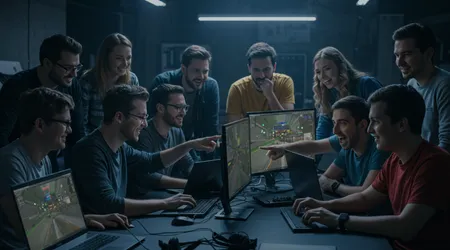Using community feedback to improve game mods

Community feedback drives the evolution of game mods, transforming player creativity into refined, impactful experiences.
Anúncios
In 2025, modding thrives as a collaborative art form, where gamers and developers unite to enhance multiplayer titles.
This article explores how community feedback shapes mods, fostering innovation, strengthening bonds, and extending game lifespans.
From ethical debates to technical triumphs, we’ll uncover why listening to players is the heartbeat of modding success.
Modding isn’t just about tweaking code or slapping new textures on a game it’s a conversation. Players voice their desires, frustrations, and dreams, while modders translate these into tangible enhancements.
This dynamic exchange fuels multiplayer communities, turning games like Skyrim and Cyberpunk 2077 into ever-evolving playgrounds.
Why does community feedback matter so much? It’s the spark that ignites creativity, ensuring mods resonate with players and align with the game’s soul. Let’s dive into how this feedback loop works, its challenges, and its transformative power.
The Power of Community Feedback in Modding
Players are the lifeblood of any multiplayer game, and their voices shape its future. Community feedback reveals what works, what breaks, and what’s missing.
Modders tap into forums, Discord, and Reddit to gather insights, turning raw opinions into polished mods. For example, the Skyrim mod Enderal began as a fan-driven project, fueled by players craving deeper narratives.
++ How to start a successful gaming podcast
This process isn’t just about fixing bugs it’s about dreaming bigger. Players might suggest new quests or balanced mechanics, inspiring modders to push boundaries.
A 2023 study by MoldStud found 63% of players recommend games with responsive developers, highlighting feedback’s role in loyalty. Modders, acting as community ambassadors, amplify this trust.
Yet, feedback isn’t a magic wand. Sorting through thousands of comments demands discernment modders must prioritize ideas that enhance gameplay without breaking the game’s core. This balance keeps multiplayer communities vibrant and engaged.

Channels for Collecting Community Feedback
Modders don’t just guess what players want they hunt for it. Platforms like Nexus Mods and Steam Workshop host vibrant discussions, with threads brimming with suggestions.
For instance, the Nexus Mods forum for Cyberpunk 2077 saw 280,000 views on a single feedback thread in 2025, showing the scale of engagement.
Social media, especially Discord and Reddit, offers real-time insights. Modders monitor these spaces to catch trending issues, like demands for better NPC AI in Baldur’s Gate 3. Beta testing also plays a key role, letting players try early mod versions and report bugs directly.
However, not all feedback is equal. Modders must filter noise vague complaints or unrealistic demands—to focus on actionable ideas.
Also read: Moderation best practices for Twitch communities
This curation ensures mods stay relevant and functional, enhancing multiplayer experiences without overwhelming developers.
Turning Feedback into Actionable Mods
Feedback is only as good as its execution. Modders analyze community feedback to identify patterns, like calls for smoother multiplayer balance in Stardew Valley. They then craft mods, from quick bug fixes to sprawling content expansions, to address these needs.
Take the Multiplayer Power Balancing Mod for Among Us in 2025. Players complained about uneven task difficulty, so modders adjusted mechanics to level the playing field.
This required tweaking code while preserving the game’s chaotic charm a delicate dance of creativity and precision.
The challenge lies in prioritization. Modders weigh feedback against technical limits and game vision. A well-executed mod, born from player input, can transform a game, but rushing risks instability. Patience and skill turn raw ideas into polished gems.
Read more: The power of voice chat etiquette in FPS teams
Implementation isn’t always smooth. Modders face compatibility issues, especially when games update, breaking existing mods.
Community feedback helps here too players often report conflicts, guiding modders to quick fixes. This iterative process strengthens mods and keeps communities engaged.
Ethical and Legal Considerations in Modding
Modding walks a tightrope between creativity and responsibility. Community feedback often pushes for bold changes, but modders must navigate ethical and legal boundaries.
For example, the 2025 Cultural Appropriation Mod for GTA V sparked backlash for oversimplifying cultural elements, raising questions about respect.
Legally, mods can infringe on intellectual property if they use external assets without permission. Developers like Bethesda embrace modding, but others, like Nintendo, issue swift cease-and-desists. Modders rely on community input to avoid crossing lines, ensuring mods enhance rather than exploit.
Ethically, feedback highlights sensitive issues. Players flagged excessive violence in a Resident Evil 4 mod, prompting modders to tone it down. This dialogue ensures mods align with community values, fostering inclusivity and trust in multiplayer spaces.
The legal landscape evolves in 2025. The EU’s Digital Services Act pushes platforms like Nexus Mods to regulate content, influenced by community reports.
Modders must adapt, balancing creativity with compliance, while feedback keeps them grounded in player expectations.
The Role of Feedback in Extending Game Lifespans
Multiplayer games thrive on longevity, and mods are the secret sauce. Community feedback fuels mods that keep games like Minecraft relevant years after release. Players suggest new mechanics, like redstone systems, which mods then refine and expand.
Consider No Man’s Sky. After a rocky 2016 launch, player feedback drove 20+ updates, many inspired by mods. These additions, like multiplayer base-building, turned a criticized game into a beloved classic, proving feedback’s power to revive titles.
Mods also boost replayability. A Fallout 4 mod adding survival mechanics came from players craving challenge. Such mods extend game lifespans, keeping communities active and sales steady, as players return for fresh experiences.
Feedback-driven mods create a virtuous cycle. Players stay engaged, modders gain motivation, and developers see sustained interest. This synergy ensures multiplayer games remain cultural touchstones, not fleeting trends.
Challenges of Integrating Community Feedback

Listening to players sounds ideal, but it’s not without hurdles. Community feedback can be a cacophony thousands of voices demanding different things.
Modders must sift through contradictory suggestions, like one group wanting harder Dark Souls mods while another begs for easier modes.
Technical limitations also bite. A modder might love the idea of a Cyberpunk 2077 metro system, but coding it without breaking the game is a nightmare. Feedback often outpaces what’s feasible, leading to frustration on both sides.
Toxicity is another issue. Some players lash out when their ideas aren’t implemented, creating tension in communities like Reddit’s Skyrim modding forums. Modders need thick skin to navigate this while staying open to constructive input.
Time is a silent killer. Modders, often hobbyists, juggle day jobs and modding. Prioritizing feedback takes effort, and burnout looms. Community patience, paired with clear communication, helps modders stay focused and deliver quality.
The Future of Community-Driven Modding
What’s next for modding in 2025? The future is collaborative. Developers like Larian Studios now integrate modding toolkits at launch, inspired by community feedback. Games like Baldur’s Gate 3 thrive on mods that add new classes, born from player suggestions.
AI is reshaping modding. Tools analyze feedback to predict player needs, like smarter NPCs or streamlined UIs. Imagine a modder using AI to craft a Witcher 3 quest based on thousands of player comments efficiency meets creativity.
Official modding pipelines are growing. Bethesda’s Creation Club, though controversial, shows developers embracing mods as paid content. Feedback will guide these platforms, ensuring they serve players, not just profits.
Communities will demand transparency. Players want modders to share how feedback shapes their work, fostering trust. As modding becomes mainstream, this dialogue will define the next era of multiplayer gaming.
Table: Key Platforms for Community Feedback in Modding (2025)
| Platform | Feedback Type | Strengths | Challenges |
|---|---|---|---|
| Nexus Mods | Forum threads, comments | Detailed, archived discussions | Overwhelming volume of feedback |
| Discord | Real-time chats | Instant player-modder interaction | Fleeting, hard-to-track comments |
| Steam Workshop | Reviews, ratings | Easy mod installation and feedback | Limited depth in feedback |
| Subreddit discussions | Broad community input, trending topics | Risk of toxicity, scattered ideas |
Practical Examples of Feedback-Driven Mods
Let’s paint a picture: a Stardew Valley modder, Alex, notices players on Discord grumbling about clunky co-op inventory systems.
He crafts a mod adding shared storage, tested via beta feedback. The result? A seamless multiplayer experience, downloaded 10,000 times in a month.
Another case: Sarah, a Cyberpunk 2077 modder, sees Reddit threads begging for a working metro. She collaborates with players to design a system that feels native, using feedback to tweak station placements. The mod goes viral, boosting community engagement.
These examples show feedback as a catalyst. Like a chef refining a recipe based on diners’ tastes, modders use player input to craft experiences that feel personal and polished.
FAQs: Community Feedback and Game Mods
Q: How do modders decide which feedback to prioritize?
A: They focus on common complaints, gameplay impact, and feasibility, balancing community desires with technical limits and game vision.
Q: Can community feedback lead to legal issues for modders?
A: Yes, if mods use copyrighted assets or break terms of service. Feedback helps modders avoid ethical and legal pitfalls.
Q: How can players provide effective feedback?
A: Use official channels, be specific, suggest solutions, and stay constructive. Detailed input helps modders create impactful mods.
In 2025, community feedback is the pulse of modding, turning player passion into innovation. By listening, modders craft experiences that resonate, extend game lifespans, and build vibrant multiplayer communities.
Isn’t it time we celebrated the players who shape the games we love? Let’s keep the conversation alive your voice could spark the next game-changing mod.
